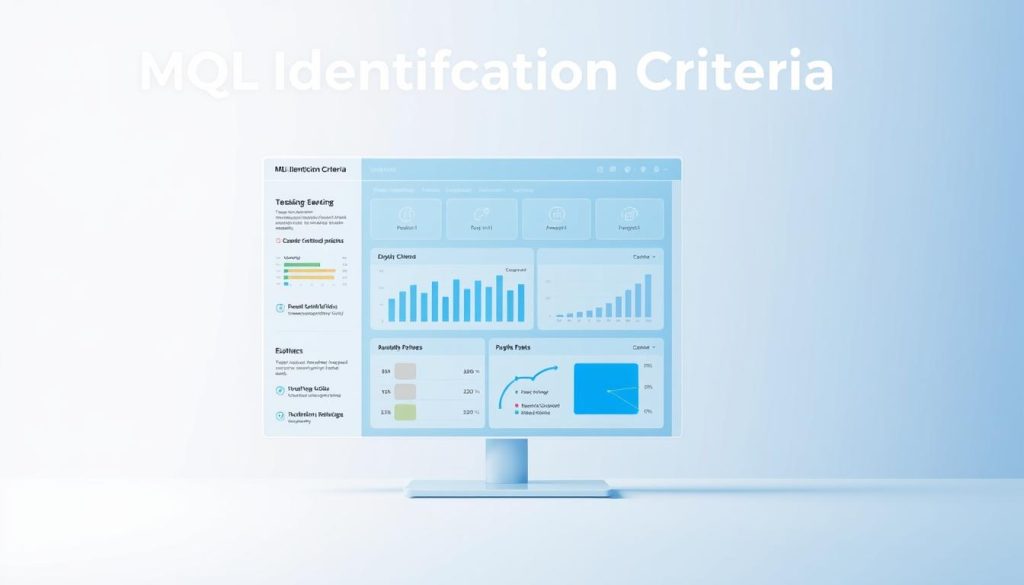We identify Marketing Qualified Leads (MQLs) as potential customers who have shown interest in our company’s products or services and are more likely to become actual customers.
Understanding and effectively managing MQLs is crucial for driving business growth. By recognizing the behaviors and criteria that define an MQL, businesses can focus their efforts on high-potential leads.
So, what is an MQL? It’s a lead that has been identified as having a higher potential to become a customer based on specific criteria and behaviors.
Key Takeaways
- Marketing Qualified Leads are potential customers who have shown interest in a company’s products or services.
- MQLs are more likely to become actual customers based on their behaviors and criteria.
- Understanding MQLs is crucial for driving business growth.
- Effective management of MQLs helps businesses focus on high-potential leads.
- MQLs are identified based on specific criteria and behaviors.
What Are Marketing Qualified Leads?
Marketing Qualified Leads represent a pivotal element in the sales funnel, acting as a bridge between lead generation and conversion. We recognize that understanding MQLs is crucial for businesses aiming to optimize their sales and marketing strategies.

Understanding the Concept
An MQL is a lead that has shown interest in a product or service and is more likely to become a customer compared to other leads. The criteria used to qualify a lead as an MQL can vary by company but typically include factors such as engagement level, demographic information, and behavior.
To effectively identify MQLs, businesses must establish clear MQL criteria that align with their sales and marketing goals. This involves analyzing historical data and understanding the characteristics of leads that have converted into customers in the past.
Importance in Sales Strategy
MQLs play a vital role in the growth of marketing and sales funnels. By focusing on MQLs, businesses can streamline their sales efforts, improving efficiency and increasing the likelihood of converting leads into customers.
Understanding how to identify MQLs is essential for developing effective sales strategies. It enables businesses to prioritize leads, tailor their marketing efforts, and ultimately drive revenue growth.
By integrating MQLs into their sales strategy, companies can create a more targeted approach to lead conversion, enhancing overall sales performance.
The Difference Between Marketing Qualified Leads and Sales Qualified Leads
Understanding the distinction between Marketing Qualified Leads (MQLs) and Sales Qualified Leads (SQLs) is crucial for businesses aiming to optimize their sales and marketing strategies. MQLs are leads that have shown interest in a company’s products or services but are not yet ready to make a purchase. On the other hand, SQLs are leads that have been vetted further and are considered ready for direct sales engagement.
Key Distinctions
The primary difference between MQLs and SQLs lies in their level of readiness to buy. MQLs are typically in the early stages of the buyer’s journey, having shown some level of engagement such as downloading content or attending webinars. SQLs, however, have demonstrated a clearer intent to purchase, often through actions like requesting a demo or contacting the sales team directly.
To illustrate the differences, consider the following table:
| Characteristics | MQLs | SQLs |
|---|---|---|
| Level of Engagement | Initial interest shown (e.g., content downloads) | Active consideration (e.g., demo requests) |
| Readiness to Buy | Not yet ready to purchase | Ready for direct sales engagement |
| Sales & Marketing Approach | Nurturing campaigns to build interest | Direct sales outreach for conversion |
How They Impact the Sales Funnel
MQLs and SQLs impact the sales funnel differently. MQLs represent the top of the funnel, where lead generation and nurturing occur. SQLs, being closer to making a purchase, are further down the funnel and require a more personalized sales approach. By understanding and effectively managing both MQLs and SQLs, businesses can optimize their sales funnel for better conversion rates.
For more insights on SQLs, visit HubSpot’s blog on Sales Qualified Leads, which provides a deeper dive into the characteristics and management of SQLs.

How to Identify Marketing Qualified Leads
In the quest to boost sales, recognizing MQLs is a critical step that businesses cannot afford to overlook. Identifying Marketing Qualified Leads effectively is the cornerstone of a streamlined sales process.
To identify MQLs, businesses must first understand the criteria that qualify a lead as “marketing qualified.” This involves analyzing demographic information, behavioral data, and engagement levels to determine a lead’s potential.
Criteria for Qualification
The criteria for qualifying MQLs can vary significantly from one business to another, depending on their specific sales strategies and target audience. However, common factors include:
- Demographic Information: Age, job title, company size, and industry are crucial in determining whether a lead fits the ideal customer profile.
- Behavioral Data: Actions such as downloading content, attending webinars, or engaging with the brand on social media indicate a lead’s level of interest.
- Engagement Levels: The frequency and depth of a lead’s interaction with the brand’s marketing efforts are key indicators of their readiness to buy.
By evaluating these factors, businesses can develop a comprehensive understanding of their leads and identify those that are marketing qualified.

Tools and Software for Lead Scoring
Lead scoring is a systematic approach to ranking leads based on their behavior and characteristics. To implement lead scoring effectively, businesses utilize various tools and software.
Some of the most popular lead scoring tools include:
- CRM Systems: Many Customer Relationship Management (CRM) systems, such as Salesforce, offer built-in lead scoring capabilities.
- Marketing Automation Platforms: Platforms like Marketo and Pardot provide advanced lead scoring features that can be tailored to specific business needs.
- Specialized Lead Scoring Software: Tools like HubSpot and Leadfeeder offer dedicated lead scoring functionalities that integrate with existing CRM systems.
By leveraging these tools and software, businesses can accurately identify MQLs and enhance their sales efficiency.
The Benefits of Having Marketing Qualified Leads
By prioritizing MQLs, companies can significantly enhance their lead quality and conversion rates. This strategic focus allows businesses to optimize their sales and marketing efforts, leading to more efficient use of resources.
Increased Sales Efficiency
Focusing on Marketing Qualified Leads enables sales teams to concentrate on high-quality leads that are more likely to convert into customers. This targeted approach reduces the time and resources wasted on unqualified leads, thereby increasing sales efficiency.
We can achieve this by implementing effective lead scoring systems that identify and prioritize leads based on their behavior, demographics, and other relevant factors. For instance, a lead that has downloaded multiple product brochures and attended a webinar is likely to be more qualified than one that has only visited the website once.
| Benefits | Description | Impact |
|---|---|---|
| Increased Conversion Rates | More qualified leads result in higher conversion rates. | Improved sales performance. |
| Reduced Sales Cycle | Focusing on qualified leads shortens the sales cycle. | Faster revenue generation. |
| Enhanced Customer Insights | Better understanding of customer needs and behaviors. | More effective marketing strategies. |
Improved Marketing Strategies
Having a clear understanding of MQLs also helps in refining marketing strategies. By analyzing the characteristics and behaviors of MQLs, businesses can identify the most effective marketing channels and tactics. For example, if a significant number of MQLs are generated through content marketing efforts, it indicates that this channel is effective and should be further leveraged.
Moreover, understanding MQLs allows for better alignment between sales and marketing teams. As discussed in HubSpot’s article on MQL definition, this alignment is crucial for maximizing the potential of MQLs and ensuring that both teams work towards common goals.
By adopting MQL best practices and focusing on MQL conversion, businesses can create a robust sales and marketing ecosystem that drives growth and revenue.
The Role of Content Marketing in Generating Marketing Qualified Leads
By leveraging content marketing, businesses can effectively attract and qualify leads, driving growth through informed marketing strategies. Content marketing plays a pivotal role in the lead qualification process by providing potential customers with valuable information that addresses their needs and pain points.

Types of Content That Attract Leads
Content that resonates with the target audience is crucial for attracting MQLs. Blog posts, eBooks, whitepapers, and webinars are effective content types that provide in-depth information, showcasing a brand’s expertise and building trust with potential customers.
For instance, a well-researched eBook on industry trends can position a company as a thought leader, attracting leads who are interested in the subject matter. Similarly, engaging blog posts that offer solutions to common problems can drive traffic to a website and encourage visitors to provide their contact information in exchange for valuable content.
Measuring Content Effectiveness
To understand the impact of content on lead generation, it’s essential to measure its effectiveness. Key performance indicators (KPIs) such as page views, engagement metrics (likes, shares, comments), and conversion rates provide insights into how well the content is performing.
Analyzing these metrics helps marketers refine their content strategies, focusing on the types of content that generate the most MQLs. For example, if a particular blog topic consistently results in high engagement and conversions, it indicates a strong interest in that topic among the target audience.
Strategies to Convert Marketing Qualified Leads
Turning MQLs into customers involves a nuanced understanding of their needs and behaviors. To achieve this, businesses employ various strategies that not only resonate with their target audience but also compel them to take action.
Nurturing Campaigns
Nurturing campaigns play a pivotal role in the conversion process. These campaigns are designed to build trust and establish a connection with potential customers by providing them with relevant and timely content.
Effective nurturing campaigns involve a series of targeted communications that cater to the different stages of the buyer’s journey. By doing so, businesses can keep their leads engaged and move them closer to making a purchase.
Personalization Techniques
Personalization is key to converting MQLs. By tailoring the customer experience to individual preferences and behaviors, businesses can significantly enhance the likelihood of conversion.
Some effective personalization techniques include:
- Using data analytics to understand customer behavior and tailor content accordingly.
- Implementing marketing automation tools to personalize email campaigns and other communications.
- Creating content that addresses the specific needs and pain points of the target audience.
| Strategy | Conversion Rate | Customer Engagement |
|---|---|---|
| Nurturing Campaigns | 25% | High |
| Personalization Techniques | 30% | Very High |
| Combined Approach | 45% | Extremely High |

By combining nurturing campaigns with personalization techniques, businesses can create a powerful strategy for converting MQLs into customers. This integrated approach not only enhances the customer experience but also drives business growth.
Common Mistakes in Handling Marketing Qualified Leads
The journey from lead to customer is fraught with pitfalls, particularly for those not following best practices in MQL management. As we navigate the complex landscape of lead generation and conversion, it’s crucial to identify and rectify common mistakes that can hinder the effectiveness of our sales strategies.
Lack of Follow-Up
One of the most significant errors in handling MQLs is the lack of timely follow-up. When leads are not promptly engaged, they can lose interest or be captured by competitors. Effective follow-up is critical to keeping the momentum going and ensuring that potential customers remain on the path to conversion.
To avoid this pitfall, businesses should implement a robust lead nurturing program. This involves regular, personalized communication that addresses the needs and concerns of MQLs. By doing so, we can build trust and keep our brand top of mind.
Misalignment Between Sales and Marketing
Another critical mistake is the misalignment between sales and marketing teams. When these departments are not synchronized, it can lead to a disjointed customer experience and a significant drop in conversion rates. Alignment is key to ensuring that MQLs are properly qualified and handed over to sales at the right moment.
To illustrate the impact of these mistakes, let’s consider the following comparison:
| Aspect | Proper MQL Handling | Common Mistakes |
|---|---|---|
| Follow-Up | Timely, personalized engagement | Lack of follow-up or generic communication |
| Sales & Marketing Alignment | Synchronized teams, clear lead handover | Misaligned teams, poor lead qualification |
| Conversion Rate | Higher conversion rates due to effective nurturing | Lower conversion rates due to missed opportunities |
By understanding and avoiding these common mistakes, businesses can significantly improve their MQL conversion rates. It’s essential to regularly review and refine our strategies to ensure we’re maximizing our potential.

As we continue to navigate the complexities of MQL management, staying informed about best practices and common pitfalls will be crucial. By doing so, we can ensure that our strategies remain effective and aligned with our business goals.
Best Practices for Managing Marketing Qualified Leads
Managing MQLs effectively requires a combination of regular lead qualification reviews and the strategic use of CRM systems. By adopting these best practices, businesses can enhance their lead management processes, ultimately driving sales growth and improving marketing efficiency.
Regular Lead Qualification Reviews
Regular lead qualification reviews are essential to ensure that your MQLs remain relevant and aligned with your sales objectives. This process involves continuously assessing lead behavior, engagement, and fit to determine their readiness to move through the sales funnel. As Forbes notes, “The key to successful lead management is not just generating leads, but qualifying them effectively.”
To implement effective lead qualification reviews, consider the following strategies:
- Establish clear criteria for lead qualification based on your ideal customer profile.
- Use data and analytics to track lead behavior and engagement.
- Regularly review and update your lead qualification criteria to reflect changes in your market or sales strategy.
By doing so, you can ensure that your sales team is focusing on the most promising leads, thereby increasing conversion rates and sales efficiency.
Using CRM Systems Effectively
CRM systems play a critical role in managing MQLs by providing a centralized platform to track, analyze, and nurture leads. Effective use of CRM systems enables businesses to personalize their marketing efforts, improve lead engagement, and ultimately drive conversions. As noted by
“CRM is not just a tool, it’s a strategy that can transform your business.”
To maximize the potential of your CRM system, consider the following best practices:
- Ensure that your CRM is integrated with other marketing tools and platforms to provide a seamless flow of data.
- Use CRM data to personalize your marketing campaigns and improve lead nurturing.
- Regularly update and clean your CRM data to maintain accuracy and relevance.
By implementing these strategies, businesses can enhance their MQL management, leading to improved sales outcomes and more efficient marketing operations.
The Future of Marketing Qualified Leads
As we look ahead, the landscape of Marketing Qualified Leads (MQLs) is poised for significant transformation. The future of MQLs will be shaped by emerging trends in lead generation and the increasing use of AI and automation in marketing and sales processes. We will explore these developments and their implications for businesses.
Trends in Lead Generation
Lead generation trends are shifting towards more targeted and engaging strategies. For instance, the use of interactive content is on the rise, allowing businesses to capture leads more effectively.
The way businesses generate leads is evolving. Trends such as personalization, content marketing, and the use of social media are becoming more prevalent. Personalization, in particular, is key to capturing the attention of potential leads.
The Impact of AI and Automation
AI and automation are revolutionizing the way MQLs are managed. From lead scoring to nurturing campaigns, these technologies are enhancing efficiency and conversion rates. We will examine the impact of these technologies on MQL conversion.
| Technology | Impact on MQL Management | Benefits |
|---|---|---|
| AI-powered Lead Scoring | More accurate lead qualification | Increased conversion rates |
| Automated Nurturing Campaigns | Personalized engagement with leads | Improved lead quality |
| Predictive Analytics | Forecasting lead behavior | Enhanced sales forecasting |
In conclusion, the future of MQLs is bright, with trends in lead generation and the adoption of AI and automation set to drive significant improvements in MQL conversion. By understanding and leveraging these developments, businesses can stay ahead of the curve.
Case Studies: Successful Companies and Their MQL Strategies
By examining the strategies of successful companies, we can gain valuable insights into effective MQL management. Various businesses have achieved significant growth by implementing robust MQL strategies, providing valuable lessons for other organizations.
Company A’s Approach
Company A, a leading software provider, has successfully integrated MQL strategies into their sales and marketing efforts. They focused on identifying high-quality leads through a combination of content marketing and lead scoring techniques.
The key to their success lay in their ability to nurture leads through personalized email campaigns and targeted content, resulting in a significant increase in conversion rates.
| Strategy | Implementation | Result |
|---|---|---|
| Content Marketing | Developed targeted blog posts and whitepapers | Increased lead generation by 30% |
| Lead Scoring | Implemented a lead scoring system to identify high-quality leads | Improved sales team efficiency by 25% |
Lessons Learned from Company B
Company B, a renowned e-commerce brand, adopted a different approach to MQL management. They focused on aligning their sales and marketing teams to ensure a seamless lead handoff process.
One of the key lessons from Company B’s experience is the importance of regular lead qualification reviews. By regularly assessing their lead qualification criteria, they were able to adapt to changing market conditions and maintain a high level of sales efficiency.
The success stories of Company A and Company B highlight the importance of tailored MQL strategies in driving business growth. By understanding and implementing effective MQL best practices, businesses can significantly improve their sales efficiency and marketing effectiveness.
Conclusion: Maximizing Business Growth Through Effective MQL Management
Effective management of marketing qualified leads (MQLs) is crucial for driving business growth and maximizing revenue potential. Understanding the marketing qualified leads definition helps businesses identify and nurture leads that are more likely to convert into customers, thereby streamlining the sales process.
By implementing a robust MQL conversion strategy, businesses can significantly improve their sales efficiency and ultimately drive revenue growth. We have explored various strategies to optimize MQL management, from lead scoring and nurturing campaigns to leveraging content marketing and CRM systems.
To maximize business growth, it’s essential to regularly review and refine your MQL management processes. By doing so, businesses can stay ahead of the competition and achieve their growth objectives. Effective MQL management is not just a one-time task, but an ongoing process that requires continuous monitoring and improvement.
